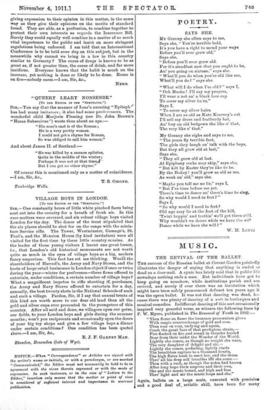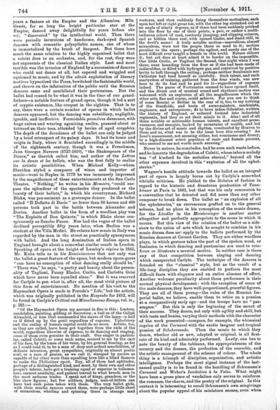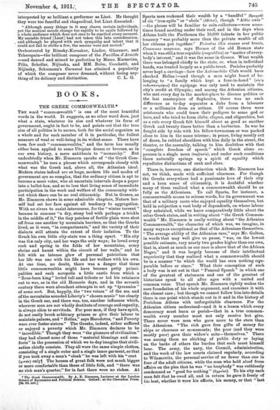MUSIC.
THE REVIVAL OF THE BALLET..
Tax success of the Russian ballet at Covent Garden pointedly illustrates the danger of saying that anything is ended or dead as a door-nail A cynic has lately said that in public life nowadays nothing ends a man. But individuals have got to keep going on somehow, while institutions perish and are revived, and surely if ever there was an institution which might have been safely pronounced defunct ten years ago it was the opera ballet. It was not that dancing was dead, be- cause there was plenty of dancing of a sort in burlesques and musical comedies. Indifferent dancing of this sort occasionally inspired very graceful verse, as witness the following lines by F. W. Myers, published in The Renewal of Youth in 1882 :— " Then flame on flame the immense proscamium glows With magic counterchange of gold and rose. Then roar on roar, undying and again, Crash the great bars of that prodigious strain,— Fire flashed on fire and sound in thunder hurled Bear from their midst the Wonder of the World. Lightly she comes, as though no weight she ware, The very daughter of delight and air,— Lightly she comes, preluding, lightly starts The breathless rapture to a thousand hearts, The high flutes hush to meet her, and the drum Thro' all his deep self trembles till she come:— Then with a rush, as though the notes had known After long hope their empress and their own, She and the ramie bound, and high and free Thro' light and air the music leaps and she Again, ballets on a large scale, executed with precision and a good deal of artistic skill. have been for many
years a feature at the Empire and the Alhambra. Mlle. Genee, for so long the bright particular star at the Empire, danced away delightfully for years before she " discovered " by the intellectual world. Then there were periodic incursions of handsome, dark-eyed Spanish dancers with romantic polysyllabic names, one of whom is immortalized by the brush of Sargent. But these bore much the same relation to the highly organized ballet that a soloist does to an orchestra, and, for the rest, they were not exponents of the classical Italian style. Last and most terrible was the invasion of England by a succession of dancers who could not dance at all, but capered and wriggled and squirmed to music, and by the adroit exploitation of literary motives hypnotized the Press, bewitched the fashionable world, and throve on the infatuation of the public until the Russian dancers came and annihilated their pretensions. But the ballet had ceased to be what it was in the time of our grand- fathers—a notable feature of grand opera, though it led a sort of cryptic existence, like croquet in the eighties. That is to say, there were a certain number of operas in which ballet dancers appeared, but the dancing was subsidiary, negligible, ignoble, and ineffective. Formidable premieres danseuses, with huge calves and wearing agonizing smiles, pranced about or tottered on their toes, attended by bevies of aged coryphees.
The depth of the decadence of the ballet can only be judged by a brief retrospect of its palmy days. It had its home and origin in Italy, where it flourished exceedingly in the middle of the eighteenth century, though it was a Frenchman, Jean Georges Noverre (1727-1810), " the Shakespeare of the Dance," as Garrick called him, and author of the Lettres sur la dense et lee ballets, who was the first fully to realize its artistic possibilities. When Michael Kelly—whom Sheridan styled a composer of wines and importer of music—went to Naples in 1779 he was immensely impressed by the magnificence of these entertainments at the San Carlo Theatre. " Nothing," he writes in his Memoirs, "could sur- pass the splendour of the spectacles they produced or the beauty of their ballets," in which his countryman, Richard Blake, was pre-eminent as a grotesque dancer. In the ballet called "Il Defatto di Dario" no fewer than 80 horses and 400 persons took part in the battle between Alexander and Darius. Another ballet in the form of a wordless play was " The Exploits of Don Quixote," in which Blake shone con- spicuously as Sancho Panza. Nor had the vogue of the ballet declined perceptibly fifty years later, when Berlioz was a student at the Villa Medici. He relates bow music in Italy was regarded by the man in the street as practically synonymous with ballet. And the long domination of Italian opera in England brought about a somewhat similar result in London. Speaking of opera at the height of Lumley's regime in 1845, Mr. Kuhe tells us in his Reminiscences that not only was the ballet a great feature of the opera, but modern opera-goers " can have no conception of what dancing really should be." " There was," he says, " a poetry and beauty about the person- ality of Taglioni, Fanny Elssler, Cerito, and Carlotta Grisi which have never been equalled since." But it was reserved for Carlyle to pen what is, after all, the most vivid picture of this form of entertainment. No mention of his visit to the Haymarket Opera is made in Fronde's " Life," but the article, which was originally published in the Keepsake for 1852, will
he found in Carlyle's Critical and Miscellaneous Essays, vol. iv., p.325:— "Of the Haymarket Opera my account in fine is this : Lustres, candelabra, painting, gilding at discretion ; a hall as of the Caliph Alraschid, or him that commanded the slaves of the lamp—a hall as if fitted up by the genii regardless of expense. Upholstery and the outlay of human capital could do no more. Artists, too, as they are called, have been got together from the ends of the world, regardless likewise of expense, to do dancing and singing, some of them even genuine in their craft. One singer in particu- lar, called Coletti, or some such name, seemed to me by the cast of his face, by the tones of his voice, by his general bearing, as far as I could read it, to be a man of deep and ardent sensibilities, of delicate intention, great sympathies, originally an almost poetic soul, or a man of genius, as we call it, stamped by nature as capable of far other work than squalling here like a blind Samson to make the Philistines sport. Nay, all of them had aptitudes, perhaps of a distinguished kind, and must, by their own and other people's labour, have got a training equal or superior in toilsome- ness, earnest assiduity, and patient travail to what breeds men to the most arduous trades. I speak not of kings, grandees, or the like show figures ; but few soldiers, judges, men-of-letters can have had such pains taken with them. The very ballet girls, with their muslin saucers round them, were perhaps little short of miraculous. whirling and spinning there in strange mad vortexes, and then suddenly fixing themselves motionless, each upon her left or right great toe, with the other leg stretched out at an angle of ninety degrees, as if there had been suddenly pricked into the floor by one of their points, a pair, or rather a multi- tudinous cohort of mad, restlessly jumping, and clipping scissors, and so bidden there rest, with opened blades, and stand still, in the devil's name ! A truly notable motion—marvellous, almost' miraculous, were not the people there so used to it; motion. peculiar to the opera ; perhaps the ugliest, and surely one of the most difficult ever taught a female in this world. Nature abhors it; but art does at least admit it to border on the impossible. One little Cerito, or Taglioni the Second, that night when I was there, went bounding from the floor as if she had been made of indiarubber, or filled with hydrogen gas, and contrived by positive levity to bolt through the ceiling; perhaps neither Semiramis nor Catherine bad bred herself so carefully. Such talent, and such martyrdom of training, gathered from the four winds, was now here to do its feat and be paid for it—regardless of expense indeed. The purse of Fortunatus seemed to have opened itself, and the divers cost of musical sound and rhythmic motion was welcomed with an explosion of all the magnificences which the other arts, fine and coarse, could achieve. For you are to think of some Rossini or Bellini in the rear of it, too, to say nothing of the Stanfields, and hosts of scene-painters, machinists, engineers, and enterprisers; fit to have taken Gibraltar, written the history of England, or reduced Ireland into industrial regiments, had they so set their minds to it. Alas ! and of all these notable or noticeable human talents, and excellent perse- verances, and energies, backed by mountains of wealth, and led by the divine art of music and rhythm, vouchsafed by Heaven to them and us, what was to be the issue here this evening ? An hour's amusement, not amusing either, but wearisome and dreary, to a high-dizened select populace of male and female persons, who seemed to me not worth much amusing."
Never in nature, he concludes, had he seen such waste before, and he laments the degradation of Coletti, whose inborn melody was " of kindred to the melodies eternal," beyond all the
other expenses involved in this " explosion of all the uphol- steries."
Wagner's hostile attitude towards the ballet as an integral part of opera is largely borne out by Carlyle's somewhat vitriolic criticism. He yielded to the dictates of fashion in
regard to the historic and disastrous production of Tann- heuser at Paris in 1861, but that was his only concession to a convention that he detested and did more than any other
composer to break down. The ballet as " an explosion of all the upholsteries," an excrescence grafted on to the general scheme, had no place in his conception of the music drama, for the Landler in the Meistersinger is another matter altogether and perfectly appropriate to the scene in which it occurs. But this view of the relation of the ballet as a side- show to the union of arts which he sought to combine in his music drama does no- apply to the ballets performed by the
Russian dancers at Covent Garden. They are either wordless plays, in which gesture takes the part of the spoken word, or fantasies, in which dancing and pantomime are used to rein- force or illustrate a musical motive. In neither ease is there any of that competition between singing and dancing
which exasperated Carlyle. The technique of the dancers is founded on the " classical " style, but as the result of a life-long discipline they are enabled to perform the most difficult feats with elegance and an entire absence of effort.
Another welcome peculiarity about these performers is their normal physical development: with the exception of some of the male dancers, they have well-proportioned, graceful figures.
They are all of them young—the rules of the Russian Im- perial ballet, we believe, enable them to retire on a pension at a comparatively early age—and the troupe have no " pas- sengers." But this is only the beginning of the secret of their success. They dance, not only with agility and skill, but with taste and brains, varying their methods with the character of the work presented—compare, for example, the whimsical caprice of the Carnaval with the exotic languor and tropical passion of Scheherazade. Then the music to which they dance, whether old or new, adapted or original, is all first- rate of its kind and admirably performed. Lastly, one has to note the beauty of the tableaux, the appropriateness of the scenery and the dresses, the perfection of the ensemble, and the artistic management of the scheme of colour. The whole thing is a triumph of discipline, organization, and artistic intelligence. Perhaps the most signal instance of the last- named quality is to be found in the handling of Schumann's
Carnaval and Weber's Invitation a la Valse. What might have been a gross piece of vandalism only serves to reinforce
the romance, the charm, and the poetry of the original. In this context it is interesting to recall Schumann's own misgivings about the popular appeal of his miniature scenes, even when interpreted by so brilliant a performer as Liszt. He thought they were too fanciful and rhapsodical, but Liszt dissented :
"Although many things in it may charm certain individuals, yet the musical moods change too rapidly to be easily followed by a whole audience which does not care to be startled every moment. My amiable friend [Liszt] had not taken this into consideration, and although he played with such sympathy and talent that it could not fail to strike a few, the masses were not moved."
Orchestrated by Rimsky-Korsakov, Liadov, Glazunov, and Tcherepnin—the brilliant composer of the Pavillon d'Armide —and danced and mimed to perfection by Mmes. Karsavina, Piltz, Schollar, Nijineka, and MM. Bolm, Cecchetti, and Nijinsky, Schumann's Carnaval has attained a popularity of which the composer never dreamed, without losing any-
thing of its delicacy and distinction. C. L. G.








































































 Previous page
Previous page